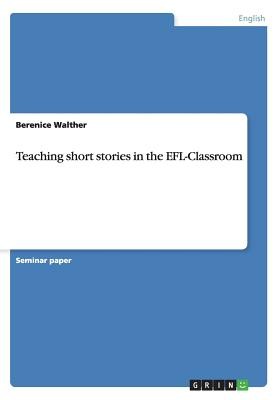
- We will send in 10–14 business days.
- Author: Berenice Walther
- Publisher: GRIN Verlag
- Year: 2014
- Pages: 20
- ISBN-10: 3656661332
- ISBN-13: 9783656661337
- Format: 17.8 x 25.4 x 0.1 cm, softcover
- Language: English
- SAVE -10% with code: EXTRA
Reviews
Description
Seminar paper from the year 2007 in the subject American Studies - Literature, grade: 1,3, University of Münster, course: Teaching Short Stories in the EFL-Classroom, language: English, abstract: The short story has its origins in traditional oral storytelling. Many of the world's greatest literary classics such as El Cid, La Chanson de Roland, Beowulf or the Odyssey were originally orally transmitted. In most cases, the story has undergone many modifications in the course of the telling processes; still they are today's primary testimonies for language, history, culture and people of the past. They were told in rhyming and therefore functioned as a mnemonic device for easier recall . In Europe, the short story began to evolve from oral storytelling in the early 14th century with Chaucer's Canterbury Tales and Boccacio's Decamerone, books consisting of individual short stories within a larger frame story. Only in the 19th century, modern short stories began to be considered a proper genre. Print magazines represented a strong market for short fiction, theories related to this began to surge, as for example, Edgar Allan Poe's The Philosophy of Composition. Nowadays, the number of commercial magazines publishing short stories has decreased but they appear to have found their place in online publications. Today, reading has become a minor activity in people's lives with globalisation, technological progress and a fast-growing media industry. In schools, pupil's interest is increasingly difficult to stimulate, especially when it comes to literature in the English Second Language classroom. Students are used to fast information input without necessarily having to become active themselves, they lose concentration easily when the learning process takes too long or they lose patience when they do not understand right away. The use of short stories in the English Foreign Language classroom is one possibility to respond to this problem teachers of foreign languages have to f
EXTRA 10 % discount with code: EXTRA
The promotion ends in 17d.20:41:21
The discount code is valid when purchasing from 10 €. Discounts do not stack.
- Author: Berenice Walther
- Publisher: GRIN Verlag
- Year: 2014
- Pages: 20
- ISBN-10: 3656661332
- ISBN-13: 9783656661337
- Format: 17.8 x 25.4 x 0.1 cm, softcover
- Language: English English
Seminar paper from the year 2007 in the subject American Studies - Literature, grade: 1,3, University of Münster, course: Teaching Short Stories in the EFL-Classroom, language: English, abstract: The short story has its origins in traditional oral storytelling. Many of the world's greatest literary classics such as El Cid, La Chanson de Roland, Beowulf or the Odyssey were originally orally transmitted. In most cases, the story has undergone many modifications in the course of the telling processes; still they are today's primary testimonies for language, history, culture and people of the past. They were told in rhyming and therefore functioned as a mnemonic device for easier recall . In Europe, the short story began to evolve from oral storytelling in the early 14th century with Chaucer's Canterbury Tales and Boccacio's Decamerone, books consisting of individual short stories within a larger frame story. Only in the 19th century, modern short stories began to be considered a proper genre. Print magazines represented a strong market for short fiction, theories related to this began to surge, as for example, Edgar Allan Poe's The Philosophy of Composition. Nowadays, the number of commercial magazines publishing short stories has decreased but they appear to have found their place in online publications. Today, reading has become a minor activity in people's lives with globalisation, technological progress and a fast-growing media industry. In schools, pupil's interest is increasingly difficult to stimulate, especially when it comes to literature in the English Second Language classroom. Students are used to fast information input without necessarily having to become active themselves, they lose concentration easily when the learning process takes too long or they lose patience when they do not understand right away. The use of short stories in the English Foreign Language classroom is one possibility to respond to this problem teachers of foreign languages have to f


Reviews